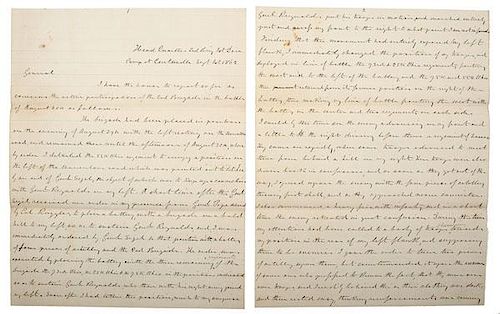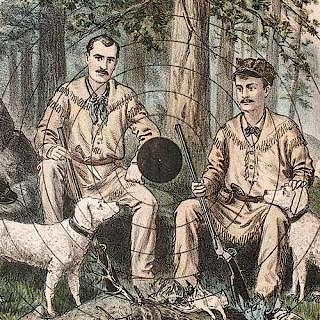Union General Nathaniel McLean, Manuscript Report for the Battle of Second Bull Run, 1862
About Seller
6270 Este Ave.
Cincinnati , OH 45232
United States
With offices in Cincinnati, Cleveland and Denver, Cowan’s holds over 40 auctions each year, with annual sales exceeding $16M. We reach buyers around the globe, and take pride in our reputation for integrity, customer service and great results. A full-service house, Cowan’s Auctions specializes in Am...Read more
Two ways to bid:
- Leave a max absentee bid and the platform will bid on your behalf up to your maximum bid during the live auction.
- Bid live during the auction and your bids will be submitted real-time to the auctioneer.
Bid Increments
| Price | Bid Increment |
|---|---|
| $0 | $25 |
| $500 | $50 |
| $1,000 | $100 |
| $2,000 | $250 |
| $5,000 | $500 |
| $10,000 | $1,000 |
| $20,000 | $2,500 |
| $50,000 | $5,000 |
| $100,000 | $10,000 |
About Auction
Nov 20, 2015 - Nov 21, 2015
Cowan's Auctions dawnie@cowans.com
- Lot Description
Union General Nathaniel McLean, Manuscript Report for the Battle of Second Bull Run, 1862
Five-page manuscript report in McLean’s hand to Brig. General Julius Stahel, his immediate commander. Prepared at Head Quarters, 2nd Brig. 1st Div., Camp at Centerville, Sept 1st 1862. The report reads in part:
General,
I have the honor to report so far as concerns the active participation of the 2nd Brigade in the battle of August 30th as follows….
Soon after I had taken this position, much to my surprise Genl. Reynolds put his troops in motion, and marched entirely past and across my front to the right to what point I am not informed. Finding that this movement had entirely exposed my left flank, I immediately changed the position of my troops, and deployed in line of battle the 73rd & 25th Ohio regiments fronting the west and to the left of the battery, and the 75th and 55th Ohio then returned from its former position on the right of the battery, then making my line of battle fronting the west with the battery in the center and two regiments on each side. I could by this time see the enemy advancing on my front, and a little to the right driving before them a regiment of Zouaves.
They came on rapidly, when some troops advanced to meet them from behind a hill on my right. These troops were also driven back in confusion, and as soon as they got out of the way, I opened upon the enemy with the four pieces of artillery throwing first shell, and as they approached nearer canister. I also commenced a heavy fire with infantry, and in a short time the enemy retreated in great confusion. During this time my attention had been called to a body of troops advancing towards my position in the rear of my left flank, and supposing them to be enemies I gave the order to turn two pieces of artillery upon them, but countermanded it upon the assurance of someone who professed to know the fact, that they were our own troops and I readily believed this as their clothing was dark, and then rested easy, thinking reinforcements were coming to take position on my left and occupy the place vacated by Genl. Reynolds….
During the course of the action Genl. Schenck with several regiments came to my aid, but not until I had changed front. He greatly aided me by his gallant conduct in rallying, and cheering on the men, until he received the wound which drove him from the field. The loss is smaller than I supposed, under the circumstances it could possibly be…. Both officers and men with few exceptions behaved with great gallantry, and had such support been given to me, as to protect my rear from the terrible attack made upon me from that quarter, I could have continued to drive the enemy, and successfully resisted his attack.
My own horse was killed under me during the hottest of the fire.
N.C. McLean, Col.
Comd 2nd Brig 1st Div
1st Army Corps, Army of Va.
Nathaniel Collins McLean, Brigadier General, USV
Lots 64-67
Nathaniel Collins McLean was born in Warren County, Ohio in 1815 to a prominent family, whose father was John McLean, a member of Congress, a future Postmaster General and later an Associate Justice of the U.S. Supreme Court. His most famous opinion was a dissent from the majority in Dred Scott vs Sandford, in which the justice spoke out against slavery. Young McLean was educated at Augusta College in Kentucky and received his law degree from Harvard College in 1838, when he married Judge Burnett’s daughter and began his own practice in Cincinnati.
In Autumn 1861 McLean helped organize the 75th Ohio Infantry at Camp John McLean and became its first Colonel, leading the regiment gallantly at the battle of McDowell, Virginia in early May 1862. Following Robert Schenk’s promotion at the battle of Cross Keys, McLean commanded the Ohio Brigade, consisting of the 25th, 55th, 73rd and 75th Regiments. Following the battle, General John C Fremont wrote to Secretary of War Stanton, stating McLean “distinguished himself by cool and steady courage and skillful handling of the troops under his command.”
His warmly praised conduct in action at Second Bull Run, where his brigade stubbornly held a difficult position on Chinn Ridge, led to his promotion to Brigadier General in November 1862. In that fight, “McLean [saw] a Union battle flag [and] realized that the flag’s wounded bearer was sitting upright supporting the colors of the 75th Ohio. McLean, Capt. Andrew Harris and a few men ran back to retrieve the colors. Although mortally wounded, Brady refused to release his grip. Harris pried each finger off the staff to free it from Brady’s devoted grasp.”
At the battle of Chancellorsville McLean’s Brigade was part of Howard’s 11th Army Corps and charged with anchoring the Army of the Potomac’s right in the woods west of the crossroads village. All through the afternoon of May 2nd, 1863, reports of Confederates marching to the right were sent to both corps and army headquarters, finally warning of a massive Confederate attack, which shortly thereafter crushed the Union Right. As second brigade from the right, McLean’s men were unable to stem Jackson’s onslaught.
In the aftermath of high-level finger-pointing, Howard averted culpability and shifted blame to his immediate subordinates and the German-American troops of his corps. In reality, few troops so positioned and greatly outnumbered could have stopped the unexpected early evening assault. Discouraged by his superior’s criticism, McLean requested reassignment to the Department of the Ohio, to which he was appointed Provost Marshal General, a post he retained for nearly a year. In this assignment McLean was based near his Cincinnati home and enjoyed the affections of his large family.
On May 19, 1863, McLean bid farewell to his command, with Lieut. Ladley recalling: The whole brigade was drawn up in mass, the General mounted on a splendid gray horse which the 75th presented to him, rode in front and rear of our line, then halted in front of center. He then made a short and affecting speech, spoke of our trial and hardships, and especially of his old Regiment the 75th. Tears came in his eyes and he was much moved. When he had closed he passed down the line of officers and shook every one by the hand. So ended the farewell of Gen. N. C. McLean, a noble, brave and patriotic Soldier, one who was beloved by all, and especially by his old regiment.
During Sherman’s campaign for Atlanta, McLean commanded a brigade of Kentucky and Tennessee regiments in Schofield’s 23rd Corps. General Jacob Cox later wrote to Secretary Stanton: In the battle of Resaca, Gen. McLean displayed great gallantry in leading his brigade in an assault of the Enemy’s line, where the circumstances made one of remarkable peril. His horse was shot under him at that time and though the division in which he was in was repulsed, he gained great credit for his own conduct, as did the subordinate officers and troops of that whole command.
In the operations near New Hope Church, McLean again fell under criticism from General Howard, who commanded the 4th Corps, for allegedly failing to properly support troops of Howard’s Corps. On June 17th, 1864 McLean requested reassignment to district command in Kentucky and from there took part in operations against Saltville, Virginia. Late in 1864 he again took over a brigade in the 23rd Corps and led it from Tennessee to North Carolina, where a rendezvous with Sherman’s Army was made in March 1865.
The following month, with Confederate defeat assured, McLean resigned his commission on April 20, 1865, having served continuously throughout the war. His law practice was revived, but his interests soon turned to farming and he moved to Minnesota, where he purchased land. During the post-war years he maintained contact with officers of his command and joined the 11th Army Corps Association, Society of the Army of the Potomac. Relocating east, McLean died on January 4, 1905 at Bellport, Suffolk County, New York (Long Island) at the age of 89 and was buried in Woodland Cemetery.Very good condition with only a few very minor scattered stains.Condition
- Shipping Info
-
SHIPPING. At the request of the buyer, Cowan's will authorize the shipment of purchased items. Shipments usually occur within two weeks after payment has been received. Shipment is generally made via UPS Ground service. Unless buyer gives special instructions, the shipping method shall be at the sole discretion of Cowan's Auctions, Inc.. Cowan's is in no way responsible for the acts or omissions of independent handlers, packers or shippers of purchased items or for any loss, damage or delay from the packing or shipping of any property.
-
- Buyer's Premium



 EUR
EUR CAD
CAD AUD
AUD GBP
GBP MXN
MXN HKD
HKD CNY
CNY MYR
MYR SEK
SEK SGD
SGD CHF
CHF THB
THB














